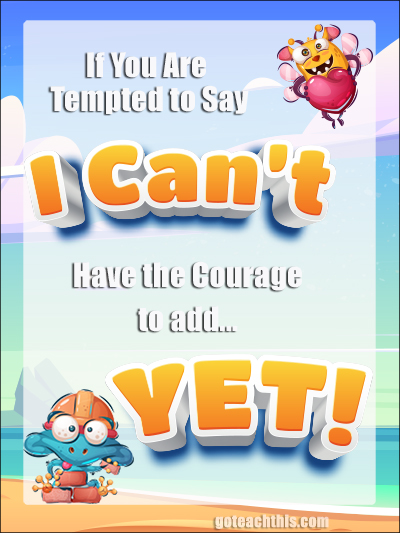Mindfulness Poster
Excellent Classroom Decoration

Mindfulness Poster:
The saying “If you are tempted to say ‘I can’t’ when it comes to doing a task, have the courage to add the word ‘yet’ so it becomes ‘I can’t do it… yet'” highlights the importance of a growth mindset. It encourages individuals to view challenges as opportunities for growth and development, rather than obstacles that cannot be overcome.
By adding the word “yet” to the phrase “I can’t,” individuals are shifting their mindset from a fixed perspective to a growth perspective. Instead of viewing the task as something that is impossible to accomplish, they are acknowledging that they currently lack the ability or knowledge to complete it, but have the potential to do so in the future. This small change in language can have a powerful impact on one’s attitude and motivation towards the task at hand.
A growth mindset can be useful in addressing self-limiting beliefs that may hold individuals back from reaching their full potential. By adopting this way of thinking, individuals can become more open to learning and development, which can ultimately lead to greater personal and professional growth. It’s a reminder a person can do anything they set their mind to, and that nothing is impossible, but it might take time and effort to achieve it.
Learned Helplessness or a Strategy?
Sometimes, when children or even grown-ups are given a task, they might say “I can’t” as their first response. This might be because they want someone else to do it for them, rather than trying to do it themselves. It’s important for teachers to understand the reason why a child might say this, it could be because they don’t have the right knowledge or skills, they are feeling frustrated, they’ve learned to give up easily, or they’re trying to ‘trick’ someone into doing it for them. Teachers must try to figure out the reason behind this attitude so they can help the child in the best ways possible.
Having the language of this poster as part of the everyday classroom language will help shift student thinking.
Wall Displays Can Become Invisible:
Be sure to foster discussion and examination around a poster by asking questions about its meaning, the potential impact on the viewer and the reasoning behind its selection by the classroom teacher. This will ensure the poster does not become “invisible” by just being hung on the wall without further engagement.
Possible Reflection Questions:
- How does this mindfulness saying align with your own perspective on challenges and obstacles in your life?
- In what ways do you currently view challenges as opportunities for growth and development?
- How do you typically respond to tasks or situations that you believe you cannot accomplish?
- How do you think incorporating the word “yet” into your language and mindset could change your approach to difficult tasks or obstacles?
- How do you currently address self-limiting beliefs that may hold you back from reaching your full potential?
- What are some specific examples of times when you wish you had adopted a growth mindset in the past?
- How can you incorporate this mindfulness saying into your daily life and practice?
- How do you think this mindfulness saying could benefit you in your personal and professional life?
- How does this mindfulness saying relate to the concept of grit and determination?
- In what ways do you think this mindfulness saying can empower and inspire you to believe in yourself and your abilities?
Where to Next?
How about some Printable Classroom Labels or Free Tangram Activities






